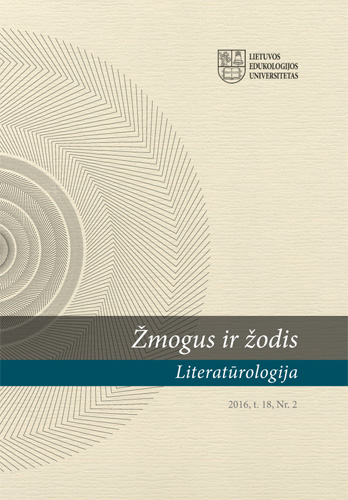Balys Sruoga kaip personažas: keli Ričardo Gavelio tekstai kultūros atminties požiūriu
Balys Sruoga as a Character: A Few Texts by Ričardas Gavelis in the Light of Cultural Memory
Author(s): Loreta MačianskaitėSubject(s): Recent History (1900 till today), Lithuanian Literature, Cultural Anthropology / Ethnology
Published by: Vytauto Didžiojo Universitetas
Keywords: Balys Sruoga; Ričardas Gavelis; literary script; Soviet period; Camp literature; Aesopian language;
Summary/Abstract: The article analyzes Balys Sruoga’s (1896-1947), the author of memoirs Dievų miškas (The Forest of the Gods), personal and creative reception during Soviet period; more precisely his biography’s literary reinterpretation in which the writer himself acts as a character. This new theme in Lithuanian literary science is analyzed using formerly unknown archival material, two literary scripts written by Ričardas Gavelis in 1981, which adapted The Forest of the Gods. The other material is yet another text by Gavelis, a very significant novel, Vilnius Poker (1989), in which one of the characters, professor Bolius, shares some similarities with real Balys Sruoga. The analysis of Gavelis’s texts highlights three different Sruoga’s biography cultural roles: holy fool, martyr and the victim of history. The article associates these three roles to the alteration of consciousness from classical humanism towards post-humanist nihilism, which correlates with the dichotomy of Gulag’s image as perceived by Aleksandr Solzhenitsyn and Varlam Shalamov. In Soviet times, The Forest of the Gods functioned as the Aesopian language shield enabling authors to speak about Soviet camps. In the 1980s, the text was too dangerous to make it into a film. In the 21st century, Sruoga’s tragic fate and his book’s value have not diminished in Lithuanian culture. However, there is a need to actualize other writer’s personal and creative aspects which still hide in the shadow of cultural memory.
Journal: Žmogus ir žodis
- Issue Year: 18/2016
- Issue No: 2
- Page Range: 45-62
- Page Count: 18
- Language: Lithuanian

